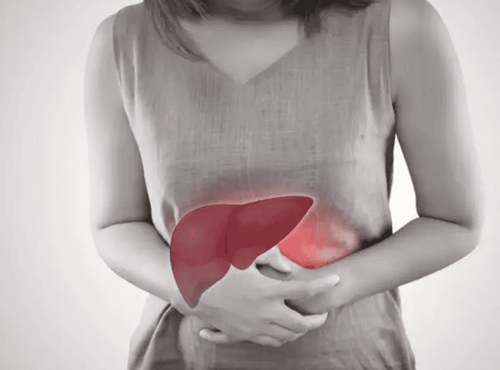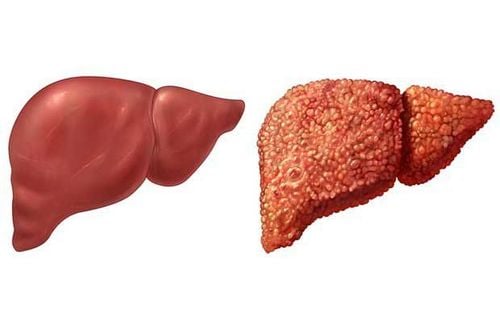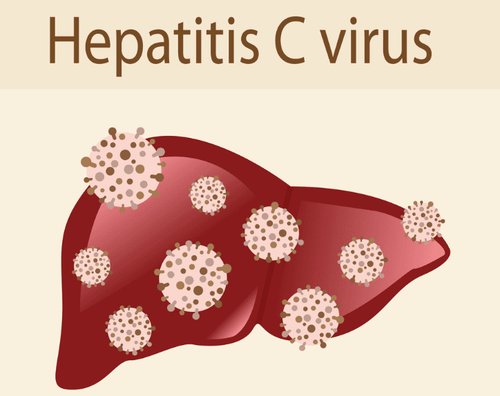This is an automatically translated article.
The article is advised by Master, Doctor Nguyen Thi Nhat - Infectious Diseases - Department of Medical Examination & Internal Medicine - Vinmec Hai Phong International General Hospital.Hepatitis C is a dangerous infectious disease, because it often causes few specific symptoms, so people can be infected with the virus for many years without realizing it. Once infected, chronic hepatitis C will silently damage the body, leading to serious complications if not treated promptly.
1. What is Hepatitis C?
Hepatitis C is a disease caused by a virus called Hepatitis C virus. This virus usually enters the body through blood, sex or from mother to child, leading to inflammation and necrosis of liver tissues.On the other hand, the C virus can cause two types of hepatitis, including acute and chronic hepatitis, without any specific symptoms of the disease. Most people with the disease can only detect them through a hospital visit, or performing diagnostic tests for another medical condition.
There are two main types of hepatitis C, including:
Acute hepatitis C: The C virus attacks the body and damages the liver. This stage lasts only about 6 months, without any obvious symptoms, so it is difficult to detect the disease. Chronic hepatitis C: During this stage, the virus that causes hepatitis C has existed in the liver and blood for more than 6 months, the symptoms also begin to manifest more clearly. If hepatitis C is not treated early, it can cause serious liver damage, along with other dangerous complications to the patient's health.
2. Causes of Hepatitis C
In general, the route of infection with hepatitis C virus is similar to that of hepatitis B. You can get hepatitis C in the following cases:Direct contact with the blood of an infected person Receiving blood infected with the hepatitis C virus from an infected person Mother passes it on to her baby through childbirth Use Share personal items such as toothbrushes and razors. Sharing equipment used in beautification or dentistry that has not been previously sterile.

People with a history of hepatitis C infection People with HIV People who have unprotected sex with someone who has hepatitis C Having a close relative sick family People who work in a medical environment who have to come into contact with a lot of samples People who use stimulants, regularly inject drugs People who perform piercings, cosmetic tattooing at beauty establishments does not guarantee quality and safety.
3. Symptoms of Hepatitis C
In the acute phase, hepatitis C usually causes the following symptoms:Fatigue Headache Has flu-like symptoms Feeling of pain or discomfort when gently pressing on the intercostal area Pain in the area right lower quadrant Flatulence Abdominal pain Anorexia Jaundice, yellow eyes Dark urine.

The body feels extremely tired, exhausted Itching skin Skin that bleeds, or bruises easily Unexplained weight loss Difficulty concentrating Constantly depressed, anxious Taste changes Pain in muscles and joints Ascites occurs ⇒ What to do when you have hepatitis C virus?
4. The effects of hepatitis C on the body if left untreated
Hepatitis C is one of the dangerous infectious diseases, which can be life-threatening if not detected and treated promptly. When hepatitis C is left untreated, it can cause the following serious consequences:Liver problems: The infection leads to severe damage to the liver. The hepatitis C virus causes the liver to swell. If not treated early, it can lead to a long-term infection (chronic hepatitis C). The disease can then cause the following problems:
Cirrhosis Liver failure Liver cancer .

Thrombocytopenia can cause easy bruising or red spots under the skin. These are the signs known as thrombocytopenic purpura.
Cancer: People with hepatitis C have a higher chance of developing non-Hodgkin lymphoma (non-Hodgkin lymphoma), a type of cancer that starts in the immune system. In addition, the C virus also increases the incidence of liver cancer and bile duct cancer.
Increases blood sugar levels: Hepatitis C can make it difficult for the body's cells to absorb sugar from foods. The pancreas then produces more insulin, a hormone that helps transport sugar into the cells of the body. This causes blood sugar to rise. Over time, the body becomes unresponsive to the effects of insulin, leading to type 2 diabetes.
Joint and muscle pain: People with hepatitis C often experience joint pain. However, it is different from arthritis, which often causes pain and swelling in the joints. In addition, hepatitis C can also lead to fibromyalgia, which causes body aches and pains.
Kidney disease: People with hepatitis C have an approximately 40% increased risk of developing chronic kidney disease compared with those who are not infected. If you have liver or kidney problems that aren't treated early, you'll be twice as likely to need treatment for dialysis, aka hemodialysis, in the future.
Heart problems: Hepatitis C is linked to hardening of the arteries, also known as atherosclerosis. This condition can increase your risk of stroke, heart attack, and a number of other heart problems.
Mental health effects: Hepatitis C can also have some negative effects on a person's mental health. Patients may have difficulty remembering things, or may not be able to concentrate for certain periods of time. In addition, the person may also feel very tired and weak.
Nerve problems: Hepatitis C can lead to peripheral neuropathy, causing numbness or burning in the hands and feet. Another condition also associated with hepatitis C is paresthesia, which causes tingling or numbness in the skin.
Osteoarthritis: This is a rare condition that causes new bone to form faster than the body can respond. This disease mainly affects the legs or feet.
Rheumatoid arthritis : When the C virus enters the body, the immune system will be activated to fight them. As the virus multiplies in the blood, the immune system has to work constantly, leading to overload. This can cause rheumatoid arthritis, along with other rheumatic diseases.
Skin problems: Hepatitis C can cause bumps, blisters, or itching in the skin. They can also lead to vitiligo, a condition that causes decreased skin pigmentation in areas such as the face, elbows, wrists, or knees.

5. Life expectancy and prognosis
In fact, complications of chronic hepatitis C can lead to death. Approximately 30,000 people in the United States die each year from cirrhosis of the liver. Worldwide, an estimated 400,000 people die each year from cirrhosis and liver cancer.How hepatitis C affects everyone is different. According to statistics, about 70-80% of cases are chronic hepatitis C. Within 20 years, about 20-30% of those people will develop cirrhosis. Depending on the type of cirrhosis, the treatment for each patient will be different. In severe cases, a person may need a liver transplant.

Please dial HOTLINE for more information or register for an appointment HERE. Download MyVinmec app to make appointments faster and to manage your bookings easily.
Reference source: webmd.com













